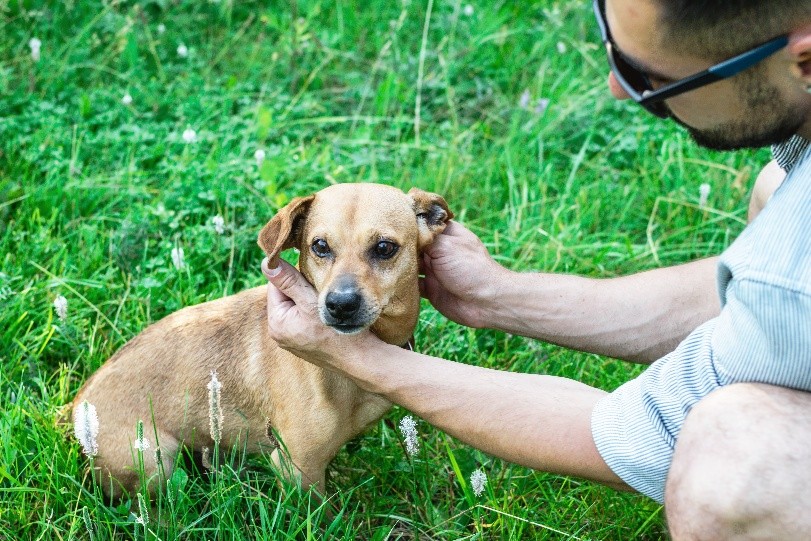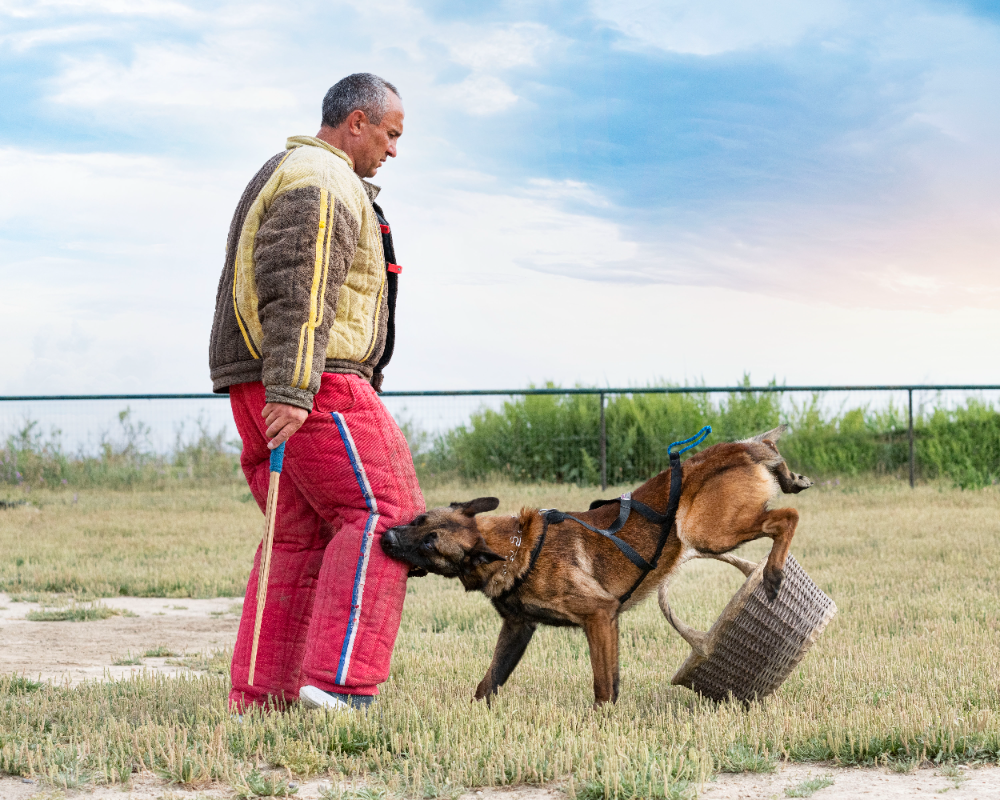When Dog Bites Leave More Than Physical Scars: Your Path Forward
The moments after a dog bite can be chaotic and frightening. You're likely dealing with pain, possible injury, and uncertainty about what to do next. Dog bite incidents happen more frequently than many realize, with thousands of Americans requiring medical attention each year for these injuries. In Wisconsin, dog owners are held responsible for injuries their pets cause, but knowing your rights and taking appropriate action immediately after the incident is crucial to protect both your health and legal interests. Understanding the correct steps can significantly impact your recovery and potential compensation for your injuries.
Don't let the aftermath of a dog bite leave you in a bind. Reach out to Nicolet Law for guidance on navigating the complexities of your case. Call us at (414) 260-2220 or contact us today to ensure your rights are safeguarded and you receive the compensation you deserve.

Understanding Wisconsin's Dog Bite Laws and Your Rights
Wisconsin has laws governing dog bite liability that differ from those of many other states. Under Wisconsin Statute § 174.02, dog owners are strictly liable for any injuries their dogs cause, regardless of whether the dog had previously shown aggressive behavior. You don't need to prove the owner was negligent or knew their dog was dangerous to pursue compensation. Wisconsin follows what's commonly called a "strict liability" rule, which holds the dog owner accountable for damages even after the first bite - unlike states with "one bite" rules. Additionally, if the dog has previously bitten someone and the owner was notified, you may be entitled to double damages. Understanding these legal protections is essential when determining your next steps after suffering a dog bite injury in Milwaukee. Many victims don't realize they have the right to compensation not just for medical bills but also for lost wages, pain and suffering, and potential long-term complications from the incident.
The 5 Critical Steps to Take Immediately After a Dog Bite
Acting quickly and decisively after a dog bite incident can significantly impact your physical recovery and any future legal action. Following these essential steps helps preserve evidence, establish documentation, and ensures you receive proper care. Each of these actions serves a specific purpose in protecting your health and legal rights following a traumatic dog bite incident.
Finding the Right Path Forward After a Dog Bite Incident
Recovering from a dog bite incident involves multiple considerations, including your physical healing, emotional well-being, and financial recovery. Many victims underestimate the potential economic impact, which can include emergency room visits, possible reconstructive surgery, prescription medications, physical therapy, and lost wages during recovery. Insurance companies often attempt to minimize payouts, offering quick settlements that may not cover long-term complications.
At Nicolet Law, we understand the Wisconsin-specific laws that protect dog bite victims and how to navigate the complexities of these cases. Our attorneys work to ensure all current and future medical expenses are considered when pursuing compensation. While many cases can be settled through negotiation with insurance companies, we prepare each case thoroughly as if it may go to trial, which often results in more comprehensive settlements for our clients. The right legal approach can distinguish between struggling with medical bills and securing the resources needed for complete recovery.
The Hidden Dangers of Dog Bite Injuries: What You Need to Know
Dog bite injuries often extend beyond the initial trauma and visible wounds. The physical consequences can range from puncture wounds and lacerations to crush injuries from powerful jaws, nerve damage, and even broken bones in severe cases. However, what many victims don't anticipate are the potential long-term complications that may develop days or weeks after the incident. Infections are perhaps the most common concern, with dog mouths harboring numerous bacteria that can cause serious infections like cellulitis, MRSA, or even sepsis if left untreated. Scarring and disfigurement are also significant concerns, particularly for bites to the face or other visible areas, which might eventually require cosmetic surgery. Beyond the physical impact, many dog bite victims experience psychological effects, including post-traumatic stress disorder (PTSD), anxiety around dogs, or other ongoing emotional distress that may require therapy. Understanding these potential complications is essential for ensuring you receive proper compensation for all aspects of your immediate and long-term recovery.
Assessing Dog Bite Severity and Required Medical Interventions
Dog bites are typically classified by severity, ranging from Level 1 (aggressive behavior without skin contact) to Level 6 (victim death). Most compensable injuries fall between Levels 3-5, which involve punctures, lacerations, and potentially severe tissue damage. These more serious bites often require specialized medical care beyond initial emergency treatment. In our experience, even what appears to be a moderate bite can develop complications if certain risk factors are present. We've seen cases where delayed infection set in several days after the incident, turning what seemed like a healing wound into a serious medical emergency requiring hospitalization and intravenous antibiotics.
Navigating Insurance Claims After a Dog Bite Incident
Most dog bite claims are filed against the dog owner's homeowner's or renter's insurance policy, which typically includes liability coverage for injuries caused by the insured's pets. However, navigating the insurance process can be challenging, as insurance companies employ various tactics to minimize payouts. The Insurance Information Institute reports that dog-related injury claims account for over one-third of all homeowner's liability claims paid out, with the average cost per claim nationwide reaching approximately $50,245 in recent years. This high cost means insurers are motivated to dispute claims or offer quick, below-value settlements. Some insurance policies also have specific exclusions for certain dog breeds or may have caps on animal liability coverage. Additionally, some insurers require separate animal liability policies for dogs with a previous bite history. Understanding what coverage applies to your situation is crucial for maximizing your compensation.
Dealing with Uninsured or Underinsured Dog Owners
Not all dog owners have insurance that covers dog bite liability, creating complexities for victims seeking compensation. In cases where the dog owner lacks adequate insurance coverage, alternative avenues for recovery may include filing a direct lawsuit against the owner, identifying other potentially liable parties (such as property owners who permitted a dangerous dog on their premises), or, in some cases, exploring coverage under your insurance policies. When dealing with uninsured dog owners, it becomes imperative to thoroughly document the incident and your damages, as you may need to pursue the owner's assets to recover compensation. If the owner is a renter, the property owner or landlord might share liability if they knew about the dangerous dog and failed to take appropriate action.
Special Considerations for Dog Bites Involving Children
Children are disproportionately affected by dog bite incidents, with statistics showing they are more likely to suffer severe injuries and require hospitalization than adults. The physical and psychological impact on children can be particularly profound and long-lasting. When a dog bites a child, additional factors must be considered in the legal process, including how the injury might affect their development, potential for revision surgeries as they grow, and long-term psychological effects. Wisconsin law provides special protections for child victims, including a longer statute of limitations that may allow them to pursue claims after reaching adulthood. Additionally, the legal standard for contributory negligence differs for children, recognizing their limited ability to understand dangerous situations or provocation.
Preventing Future Dog Bite Incidents
While legal remedies address the aftermath of a dog bite, prevention remains the best approach. Understanding dog body language, teaching children appropriate behavior around dogs, and advocating for responsible pet ownership in your community can help reduce future incidents. Property owners and dog owners should be aware of their legal responsibilities, including proper containment, leash laws, and the importance of dog socialization and training. Suppose you've been bitten by a dog that you believe represents an ongoing threat to public safety. In that case, the reporting process you initiate can help protect others from similar injuries by potentially triggering dangerous dog proceedings or requirements for additional safeguards by the owner.
What Makes Milwaukee Dog Bite Cases Unique
While Wisconsin state law establishes the foundation for dog bite liability, local Milwaukee ordinances add additional layers of regulation that can impact your case. Milwaukee has specific leash laws, dangerous dog regulations, and reporting requirements that differ from those of other Wisconsin municipalities. The city's dense urban environment also creates unique circumstances where dog interactions are more frequent in public spaces, apartment buildings, and shared residential areas. The local court system also has its own procedural requirements and tendencies in handling animal injury cases. Understanding these local factors is crucial when pursuing a dog bite claim in Milwaukee, as they can significantly influence case strategy, valuation, and resolution timeframes.
Building a Strong Evidence Base for Your Milwaukee Dog Bite Claim
The strength of your dog bite case depends mainly on the quality and comprehensiveness of your evidence. Additional evidence types can substantially strengthen your position beyond basic documentation of injuries and the incident. This might include animal control reports showing previous complaints about the dog, testimony from neighbors about prior aggressive behavior, evidence of violations of local Milwaukee leash ordinances, or documentation showing the dog owner's knowledge of their pet's dangerous tendencies. Medical expert testimony can be particularly valuable in establishing the connection between the bite and specific injuries, especially in cases involving infections, nerve damage, or psychological trauma. Creating a timeline of the incident and your subsequent medical treatment also helps establish the causation necessary for successful claims.
Frequently Asked Questions
In Wisconsin, you generally have three years from the date of the dog bite incident to file a personal injury lawsuit. However, this timeline can vary in certain circumstances, particularly for minors, who may have until their 20th birthday to file a claim. It's advisable to consult with a dog bite lawyer in Milwaukee as soon as possible after the incident to ensure you don't miss critical deadlines and to preserve crucial evidence that might deteriorate over time.
Yes, Wisconsin follows a modified comparative negligence rule, which means you can still recover damages even if you were partially at fault for the incident, as long as your share of fault is not greater than the dog owner's. However, your compensation will be reduced by the percentage of your fault. For example, if you're found to be 20% responsible and awarded $100,000 in damages, you would receive $80,000. A Milwaukee dog bite attorney can help establish the facts to minimize any finding of comparative negligence on your part.
Victims of dog bites in Milwaukee may be entitled to various forms of compensation, including medical expenses (both current and future), lost wages, loss of earning capacity, pain and suffering, emotional distress, scarring and disfigurement, rehabilitation costs, and property damage. In cases where the dog has previously bitten someone and the owner was notified of this fact, Wisconsin law may allow for double damages. The specific compensation in your case will depend on factors such as injury severity, long-term impact, and the circumstances of the incident.
Yes, most homeowners' and renters' insurance policies in Wisconsin cover dog bite liability, typically under the personal liability portion of the policy. However, coverage limits vary, and some policies may exclude certain dog breeds or dogs with a history of aggression. If the dog owner is a renter without insurance, the property owner might be liable in certain circumstances. It's essential to identify all possible sources of insurance coverage when pursuing a dog bite claim, which is something a Milwaukee dog bite lawyer can assist with during the initial case evaluation.
Wisconsin's dog bite law imposes "strict liability" on dog owners, meaning the owner is responsible for injuries their dog causes regardless of whether they were negligent or knew the dog was dangerous. This differs significantly from states with "one bite rules," where owners might only be liable if they knew their dog had aggressive tendencies. In Wisconsin, the owner can still be held liable even if it's the dog's first aggressive incident. Additionally, Wisconsin law provides for double damages if the dog has previously bitten someone, and the owner was aware of this, creating a stronger deterrent for negligent ownership practices.
Work with a Dog Bite Injury Lawyer
While dog bite cases may seem straightforward, they often involve complex liability issues, insurance challenges, and medical complications that require professional legal guidance. At Nicolet Law, our attorneys have experience handling dog bite cases and serious injury claims, including those involving commercial vehicles and semi-trucks. This broad experience allows us to effectively evaluate all aspects of your case, including potential long-term medical needs and full compensation value. Our team understands the physical, emotional, and financial toll that serious injuries can take on victims and their families. We work diligently to handle the legal complexities while you focus on recovery.
If you've been injured in a dog bite incident or other serious accident in Wisconsin, consider scheduling a consultation to discuss your situation and explore your legal options. This step ensures your rights are protected, and you receive the compensation needed for a complete recovery. When the unexpected happens, don't let a dog bite incident overwhelm you. Contact Nicolet Law for the guidance you need to navigate your legal journey.
Call us at (414) 260-2220 or contact us today to ensure your rights are protected and you receive the compensation you deserve.

Russell Nicolet - Dog Bite Injury Lawyer
